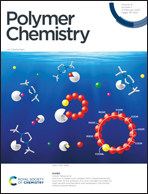Polymerization of α-olefins and their copolymerization with ethylene by half-sandwich scandium catalysts with an N-heterocyclic carbene ligand†
Abstract
The polymerization of α-olefins and their copolymerization with ethylene by half-sandwich scandium catalysts bearing an N-heterocyclic carbene ligand (NHC) with or without linking to a fluorenyl or indenyl ligand were examined. Significant influences of the ligands including the linker length on the catalyst activity and the molecular weight and composition of the resulting polymers were observed. The scandium complex bearing un-linked fluorenyl and NHC ligands (9-SiMe3fluorenyl)Sc(CH2SiMe3)2(NHC) (2) effectively inhibited the β-H elimination reaction in α-olefin polymerization, showing the characteristics of quasi-living polymerization. However, the thermal stability of this complex was poor and could be used only at a low temperature (−30 °C). In contrast, analogous scandium complexes bearing linked fluorenyl-NHC ligands with two or three CH2 spacers showed much improved thermal stability. However, in the case of the scandium complex with a two CH2 unit spacer {fluorenyl-(CH2)2-NHC}Sc(CH2SiMe3)2 (3c), serious β-H elimination took place in α-olefin polymerization. In contrast, the analogous scandium complex {fluorenyl-(CH2)3-NHC}Sc(CH2SiMe3)2 (3b) with a three CH2 unit spacer not only efficiently inhibited the β-H elimination reaction but also showed high activity in α-olefin polymerization. Moreover, the copolymerization of α-olefins and ethylene by 3b could also be efficiently achieved, affording the corresponding copolymers with controllable composition and high molecular weight.



 Please wait while we load your content...
Please wait while we load your content...